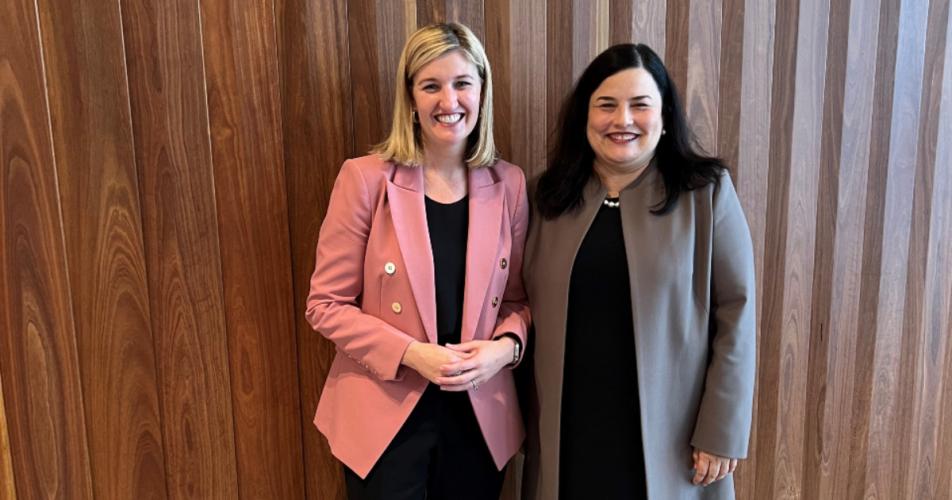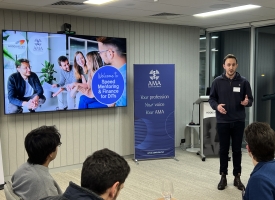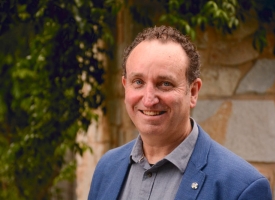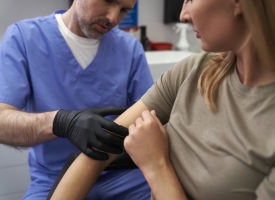Transcript - ABC Radio - Maternity services changes
The state government has listened to AMA Queensland and is implementing changes to make maternity services more accessible, but more needs to be done to ensure long-term solutions, AMA Queensland President Dr Maria Boulton has told ABC Radio Queensland.

Transcript: AMA Queensland President, Dr Maria Boulton, ABC Queensland Drive, Tuesday 18 July 2023
Subject: Maternity services in Queensland
ANNIE GAFFNEY: Now yesterday the Queensland Government announced five new initiatives to boost maternity services in rural and remote areas and to address this and allow you to be supported no matter where you live. But is it a bit too late, and when will we see these initiatives help on the ground? Well, the AMA has been calling for these measures for some time and even outlined them in their number one priority ahead of the state budget. Dr Maria Boulton is the Australian Medical Association of Queensland President. Dr Boulton, good afternoon. Will these measures help those wanting to birth in rural and remote areas in Queensland?
DR MARIA BOULTON: Good afternoon, Annie. I think they will go some way to helping, but in reality it's going to take a while for a long-term solution to be found. I travelled through central Queensland last year when I found out about the Gladstone bypass and spoke to both women, families but also doctors and midwives on the ground, both at Gladstone and Rockhampton, because as you know, Rockhampton was then covering for Gladstone and it was placed under a lot of strain. It was really dire circumstances - women not knowing where they would birth their baby, whether it would happen in Gladstone or whether they would have to make the drive up north an hour and 20 to go to Rocky, women who had very fast births previously who were afraid that they would have to give birth by the side of the road. It really is not good enough. Queensland is a very decentralised state, but we have a lot of families living in regional, rural and remote areas who do deserve better. In most of those areas, the majority of maternity services do rely heavily on the GP workforce, but those GPs also rely heavily on the support of obstetricians in regional areas. And it's important that the entire workforce is at the level it needs to be to provide those services, and that also includes nurses and midwives of course.
ANNIE GAFFNEY: So what are the five measures that have been announced? What will they do?
DR MARIA BOULTON: One of the recommendations we made was for Queensland Health to fund 20 GPs to achieve their diploma in advanced obstetrics training. We know GPs are the life force of some of these areas and we think that will help with some of those workforce issues.
The other one we've been asking for is a digital accreditation passport. The accreditations process is complex, and it should be because we want to ensure doctors working anywhere have the required accreditation and skills. But at the moment, if you're a doctor working at the Gold Coast and you've gone through the whole very complex accreditation process, those doctors can't work in another hospital outside that area without going through the accreditation process again. So if you have a doctor who wants to fill a gap, say, for example, in Cairns, they have to go through a re-accreditation process. We've been pushing for the state to be considered as a state so doctors don't have to re accredit, to remove that barrier so doctors can fill in gaps, not just in obstetrics but in every other specialty that needs to be filled, which is welcome news as a short-term solution.
They've also offered incentives for people to work in regional and rural Queensland. That's to do with Queensland Health. If you're a healthcare worker and you go to some of the Queensland Health regional areas, then you will receive an incentive. It depends how long you're there as to how much you receive. We believe those incentives should be made broader to attract GPs and practice nurses to rural and remote Queensland. We're hoping they get broadened. But these are great steps. I think that's a small spend though out of the $42 million that they have budgeted to spend.
ANNIE GAFFNEY: What kind of incentives? Sorry, Maria, to interrupt.
DR MARIA BOULTON: So there are monetary incentives. They start at about $10,000 through to $70,000, depending how long you stay in the area and what region you end up working in. These are important, because other states in Australia also offer incentives and it is essential that Queensland remains competitive so we attract the workforce to our state. But it's not all just about attracting workforce, it's also about retaining the workforce we have at the moment and ensuring that all those other maternity units that are functioning currently get the support they need so they don't end up like Chinchilla, like Cooktown, or like Gladstone was for 12 months. We've been calling for increased support for those workforces as well.
ANNIE GAFFNEY: Dr Maria Boulton, President of the AMA in Queensland, is my guest. You're listening to ABC Radio Queensland. So when you talked about the incentives, is that for the locums themselves or does it extend to the nurses and midwives? Who is eligible for those incentives?
DR MARIA BOULTON: So the incentive is for actual employees, not locums. And it extends to, as far as I know, all healthcare workers. So it extends to nurses, midwives, doctors.
ANNIE GAFFNEY: Okay. Now, do the incentives go far enough? What else do you want to see?
DR MARIA BOULTON: Well, we want to see the incentives be offered outside of Queensland Health hospitals, so we want them to be spread around to ensure we're also attracting GPs to rural and remote areas. We think those incentives need to be brought in. The other thing we need to see is, in Victoria they've announced incentives for doctors to train to become GPs and specialise in general practice and as a result we've seen more people want to become GPs and enter training. We'd like to see something similar happen in Queensland as well because at the moment we have too many vacancies for GP registrars - doctors who have decided to train and specialise in general practice. Otherwise we’ll be in trouble in 10, 15 years’ time.
ANNIE GAFFNEY: So what are the biggest areas of need? Where are they at the moment in Queensland?
DR MARIA BOULTON: Do you mean geographically?
ANNIE GAFFNEY: Yeah.
DR MARIA BOULTON: No.1 is remote, then rural, then regional, and then you go to the growth corridors within South-East Queensland and across the entire of the workforce. The main area that Queensland Health needs to focus on - No.1, No.2, No.3 - is workforce workforce workforce. We're looking at 2,500 new beds to be delivered in the next few years. But unless we have the workforce to staff those beds, it's going to hurt. We need to ensure that there's enough workforce, not just for the public hospitals, but also aged care facilities who have ratios now of how many nurses per residents work in those facilities, but also private practice, general practice, primary care.
ANNIE GAFFNEY: So if we're talking specifically birthing services, which ones are you hoping that have been on bypass will come back online out of some of these improvements the Government's announced?
DR MARIA BOULTON: It will depend on where the spread of the workforce goes. What we do know, though, is that once a service goes on bypass, so for example, Gladstone, it took 12 months to get it back. I'm not sure of the status of the maternity services that are currently working in detail. But I think that probably would be the first step - to ensure that those that are currently working and open remain open. And I know that there's a couple that come and go because they either lack anaesthetic support or they lack obstetric support. So it's probably that would be the first area of focus.
ANNIE GAFFNEY: And you mentioned there obstetric support because people for people who need treatment for say, endometriosis, this is going to help in that specialty too, you would imagine.
DR MARIA BOULTON: Absolutely. And that's an area that often gets neglected. When we travelled to Gladstone, we also heard from women who were on the gynaecology waiting list to see someone. Obstetricians also do provide gynaecological services. We heard a lot about maternity services in the media, but what we didn't hear about were the women who were waiting to be seen by a gynaecologist because they could have chronic pelvic pain, they could have undiagnosed endometriosis or they could have changes in their cervixes, for example. And it goes hand in hand. With that, too, comes the availability of termination services as well, which is another area that we know is sometimes difficult to access.
ANNIE GAFFNEY: Well, let's hope these changes announced yesterday do go some way towards making a difference for women, hoping to have babies in the more remote parts of our listening area this afternoon. Dr Maria Boulton, thanks for your time.


